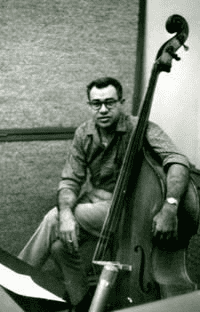Harry Babasin, one of so many Armenians who have made their name in the non-Armenian milieu and with pseudonyms or modified surnames, was a large presence as a creative and innovative bassist in the world of American jazz.
Yervant Harry Babasin (Babasinian) was born on March 19, 1921, in Dallas, Texas, to an Armenian dentist, Yervant Babasinian, and a Texan school music teacher. He attended North Texas State University and became one of many noted jazz players from the school, including Jimmy Giuffre and Herb Ellis, with whom he played in the early 1940s.
In 1942, Babasin and Ellis checked out the Charlie Fisk Orchestra and were less than satisfied with the rhythm section. They approached the bandleader and told him they could do it better. Fisk fired the previous rhythm section after a quick audition. Babasin quit the university to join the band and go on tour. During the 1940s he also toured with other well-known jazz musicians. He moved to Los Angeles when working with Charlie Barnet in 1945 and wound up joining the Benny Goodman Orchestra, with whom he made many recordings. He was also the first to record jazz solos on the cello in 1947 with the Dodo Marmarosa Trio.
He also appeared in Howard Hawks film “A Song is Born” (1948), with Danny Kaye in the main role, and became one of many jazz stars to play roles in the film, including Benny Goodman, Charlie Barnet, Louis Armstrong, Lionel Hampton, and others. On the set, he met Brazilian guitarist Laurindo Almeida, who was an extra, and both began jamming together; their quartet, which included drummer Roy Harte and saxophonist Bud Shank, was an early experiment of blending Brazilian music and American jazz. Their discs of 1954 became predecessors to the bossa nova explosion of the late 1950s and early 1960s. In the mid-1950s, the bassist put together his own ensemble, Harry Babasin & the Jazzpickers, becoming one of the only bassists of his generation who was also a bandleader. This ensemble released three albums. He also was the cofounder of the Nocturne label, which was highly regarded, even if short-lived.
In the 1960s, Babasin’s career cooled, and he returned to work with Charlie Barnet and to support Bob Hope, who was entertaining the troops. In the 1970s he and Harte initiated the Los Angeles Theaseum, an archive of West Coast jazz history.
His last tour was in 1985 with piano accompaniment by John Banister, who had given him the nickname “the Bear” because of his imposing presence and the way he clawed at the bass. Babasin passed away on May 21, 1988, in Los Angeles, having participated in possibly as many as 1,500 recordings as a bassist alone, not counting his cello work.
